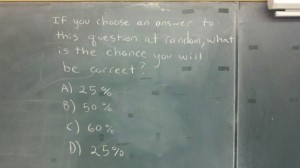In TV3 News on Tuesday, September 27, in a segment on predicting the 2011 Rugby World Cup, David Scott of the Department of Statistics at The University of Auckland gave a probability of 0.61 of the All Blacks winning the World Cup. Where did this come from?
He explains:
I did explain it a little more when talking to TV3 reporter Jane Luscombe, but essentially it was a quick and very dirty approximation to make the point that even if the All Blacks have a high probability of winning individual games, the chance of them actually winning the Cup can be disconcertingly low. Just that morning, the New Zealand Herald had reported that Graham Henry had won 84 out of 99 tests where he had coached the All Blacks, a success rate of 84.8%. To win the World Cup, the All Blacks must win three games in a row, and assuming independence that means a probability of 0.8483 = 0.61. If the probability of winning a game is as high as 90%, the probability of winning the Cup is still only 0.72, and if it is as low as 80%, then it is barely better than an even bet at 0.52.
There are reasons why the individual game probability should be higher than 84.8% and reasons why it should be lower. It should be lower because the 84/99 figure includes a lot of matches against lesser opposition than will be found in the finals of the World Cup, but higher because there is a home-ground advantage, particularly at Eden Park where the All Blacks have not lost since some time in the 1990s. If pressed I would probably say that the true probability is lower than 0.61, and may only be just above 0.5.
Tony Cooper’s calculations
Statistician Tony Cooper, of Auckland consultancy Double-Digit Numerics, has done an extensive analysis on his website.
Tony is even more downbeat on the chance of the All Blacks winning the World Cup, his probability being 0.478. He considers the likely opponents in each of the finals games and estimates the probabilities of winning the three games. First of all, he gives a rough calculation similar to mine above with probabilities of winning the three games to be 0.96, 0.58 and 0.70 giving a probability of 0.39 (All Blacks fans better prepare the sackcloth and ashes right now) …
I don’t think Tony is correct in some of his assumptions, however, and his determination of probabilities. Specifically he states:
“What about the home-game advantage? Should we increase the probability of New Zealand winning because they are playing at home? Probably. New Zealand has played better at home than away. But then you could argue that we should decrease the probability of New Zealand winning because they usually ‘choke’ at the Rubgy World Cup.
“It is difficult to asses these psychological changes in probabilities, so we remain more objective by ignoring them.”
I don’t think you can ignore the home-ground advantage. My analysis of the Super 15 and previous World Cups suggest a home ground advantage of 5 points. The same advantage appears to exist in the NRL.
My second criticism of Tony’s methodology is to question the relevance of some of his data. Yes, you can look at some thousands of past games, but surely most recent data is of more importance than data from 1987 or 1991? That is why I am a believer in exponential smoothing as a way of properly accounting for the relevance of the data.
Finally, there is the question of choking. There have been six Rugby World Cups so far, and New Zealand has won one. If the probability of winning is 0.478 then the All Blacks expect to win less than 3, compared to the 1 they have won, and the probability of winning one or less is still 0.131. If they win this year that will be 2 out of 7 with a p-value of 0.264. If they don’t win this year then the p-value will drop to 0.078. If the probability of winning a World Cup is 0.61, however, then the p-value given the current success rate of 1 out of 6 is only 0.037 which would provide evidence of inferior performance at World Cups.
At this time, I don’t think it is unreasonable to say that there is scant evidence that the All Blacks choke at World Cups: all we are seeing is the playing out of sensible probability calculations.
An alternative approach
My approach would be the one espoused by Stephen Clarke who is responsible for the method I have used for predicting results. Use the predicted game margins to estimate the probabilities of each team winning individual games. Use these probabilities to simulate the course of the Cup and the eventual winner, and determine the probability of winning by the proportion of wins over a large number of simulations.
The final word
The person on the street might be tempted to think this is a statistical version of the old joke about accountants. The dodgy accountant, when asked what is 1 plus 1, replies “What would you like it to be?” However, Tony and I agree on one thing: even if the All Blacks are the best team in the world and have high probabilities of beating other teams, the probability of them winning the World Cup is actually quite low.

Recent comments on Atakohu Middleton’s posts